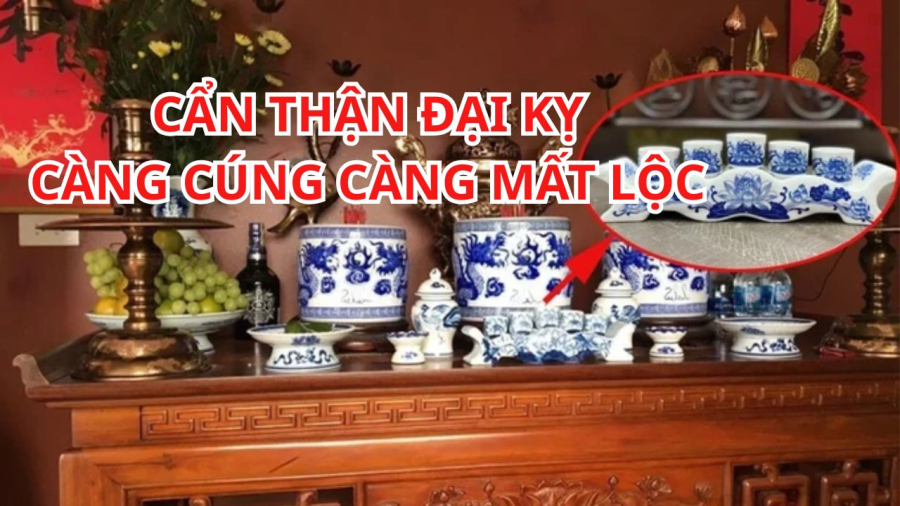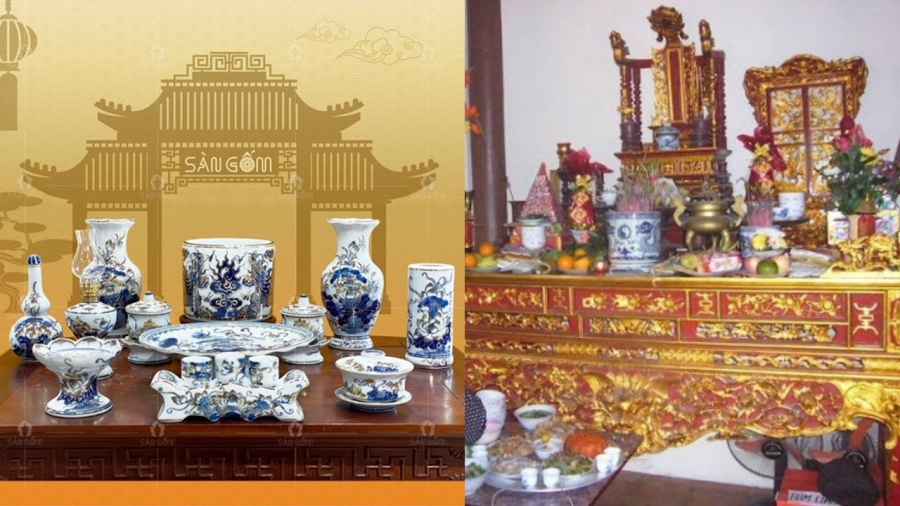Offering incense is a longstanding cultural and spiritual tradition in Vietnamese culture, demonstrating reverence for ancestors, deities, and superiors. Besides flowers, fruits, incense, and offerings, the water offered during this ritual – and specifically the number of cups – holds profound spiritual and feng shui significance. So, is it more appropriate to use one, three, or five cups of water? The following article will elucidate this question from both traditional and modern feng shui perspectives.
1. The Significance of Offering Water During Incense Burning
In spirituality, water symbolizes purity, cleanliness, and sincerity. By offering water at an altar, homeowners express their pure reverence for their superiors. The water used is typically filtered water, occasionally supplemented with the first rainfall of the season or pure spring water, imbued with cleansing energy.
The Vietnamese believe that deities and ancestors will recognize their sincerity through these offerings, with water being the first symbol of purity and selflessness. Therefore, the number of cups of water chosen not only reflects the formality of the ritual but also the homeowner’s knowledge and attitude towards worship.

2. Is It Acceptable to Use Just One Cup of Water?
The answer is yes. Many families, especially when worshipping Buddha, use one cup of water, and this does not violate spiritual or feng shui principles.
Offering one cup of water is common during simple and concise rituals, such as worshipping the God of the Land, daily worship, or when circumstances do not permit a more elaborate setup, or when the altar space is limited.
Some believe that one cup of water symbolizes singular focus, simplicity, and tranquility.
3. The Significance of Three Cups of Water on the Altar
Offering three cups of water is the most prevalent choice on ancestral altars in Vietnamese families today.
In feng shui, the number three represents Heaven, Earth, and Humanity, a harmonious trinity.
Additionally, the number three signifies the past, present, and future; father, mother, and child, forming a solid unity.
Presenting three cups of water demonstrates balance, harmony, and comprehensive reverence for both deities and ancestors.
Using three cups of water is the most suitable and standard practice for most worship rituals, especially when honoring ancestral spirits.

4. When to Use Five Cups of Water
Offering five cups of water is typically reserved for grand and formal rituals, such as:
- Worship rituals at temples, shrines, or communal houses.
- Buddhist, Taoist, or grand prayer rituals for peace and salvation.
- Special occasions like Lunar New Year, the first full moon of the lunar calendar, or Ullambana.
From a feng shui perspective:
The number five represents the five elements: Metal, Wood, Water, Fire, and Earth.
Offering five cups of water signifies cosmic balance, the harmonization of yin and yang, and the connection of celestial and terrestrial qi (energy or life force).
However, for home ancestral altars, five cups of water may be considered excessive and unnecessary, and may even give the impression of being overly ceremonial and inappropriate for the family’s worship space.
Using five cups of water is more suitable for grand rituals at temples or for Buddhist altars. In a home setting, if one wishes to express profound reverence, it is acceptable to offer five cups, provided that the altar is spacious and dignified.
5. Taboo of Using an Even Number of Cups: 2, 4, or 6
It is strictly forbidden to use an even number of cups, such as 2, 4, or 6, for water offerings. Even placing two cups symmetrically on either side is discouraged. In spiritual worship, even numbers symbolize stagnation and lack of growth, devoid of auspicious connotations. Placing an even number of cups of water on the altar is considered inauspicious.
6. Precautions When Preparing Water for Incense Burning
Regardless of whether you use one, three, or five cups of water, keep in mind the following considerations to ensure the sanctity of the ritual:
- The water should be filtered, free from odor, color, or impurities.
- The cups should be thoroughly cleaned and not used for daily drinking or eating.
- Change the water daily if incense burning is performed consecutively, avoiding stale water.
- When pouring the water, do so gently and reverently, avoiding haste or carelessness.
In conclusion, the number of cups of water used depends on the altar space and the occasion. One cup is typical for simple daily worship or when circumstances are limiting, symbolizing singular focus and tranquility. Three cups are used for ancestor worship during festivals and new moons, representing the trinity of Heaven, Earth, and Humanity, and fostering harmony. Five cups are reserved for grand rituals at temples or for Buddhist altars during significant events, symbolizing the balance of the five elements and the cosmos.
Despite the varying numbers of cups, the most important aspect is the sincerity of one’s heart, the solemnity of the ritual, and a proper understanding of worship. With this knowledge, worship ceases to be a mere ritual and becomes a meaningful spiritual connection between descendants and their ancestors.
Reference for contemplation






























